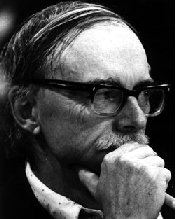Canadian Theatre Encyclopedia
The Donnellys

Trilogy of plays, each in three acts, by James Reaney including: Sticks and Stones, The St. Nicholas Hotel and Handcuffs. The plays were born from Reaney's "Listeners' Workshops," a process by which a work was created from actions and images (first in Southern Ontario, then in Halifax, Nova Scotia).
Sticks and Stones premiered at the Tarragon Theatre, November 24, 1973, directed by Keith Turnbull, lighting by John Stammers, featuring Bob Aarron, Richard Carson, David Ferry, Jerry Franken, Rick Gorrie, Miriam Greene, Ian Lange, Carol Lazare, Patricia Ludwick, Don MacQuarrie and Fletcher T. Williamson. A Protestant Irish family with seven sons and one daughter emigrates to Biddulph in southern Ontario from Tipperary in 1846 to find their new land also divided by religious factions. The tragic finale of the trilogy, the immolation of the parents, two sons and a niece in their own home, is foreshadowed, but the violence and horror become the means to revision the deaths of the Donnellys as redemptive, thereby constructing positive images by which a community or a nation can see itself. Reaney dramatizes what Rick Salutin has called Canada's "missing history," "the history of those who stood against entrenched interests and forces that sought to limit personal and social freedom and progress." Each play is a series of overlapping and intersecting variant tellings by members of the family, primarily the mother, Johannah, the second son, Will, and the daughter, Jennie, but it is also enacted by their friends and enemies in the community, played by the same fourteen actors. Their lives are circumscribed by surveyers' lines and roads, demarcations of the territories occupied by Catholic and Protestant families. Irish history is replicated in Canada as a struggle over land ownership.
The St. Nicholas Hotel premiered at the Tarragon, November 16, 1974, directed by Turnbull, set by Rosalyn Mina, lighting by Vladimir Svetlovsky, featuring Ken Anderson, Nancy Beatty, Jay Bowen, Tom Carew, Peter Elliott, Ferry, Franken, Gorrie, Miriam Greene, Michael Hogan, Ludwick, MacQuarrie, Keith McNair, Gord Stobbe and Suzanne Turnbull. The Donnellys are now at war for mastery of the road. The play traces the feud through the second generation of the family, through the story of Will's stagecoach business and the fierce competition with the rival companies, which sometimes reduces their stage coaches to fragments of wood and their barns to burned-out shells. Religious alignments are entrenched in political loyalties, and the Donnellys again refuse to conform, throwing their weight behind the Reform Party, resulting in the narrow defeat of the Conservative candidate.
Handcuffs premiered at the Tarragon, March 29, 1975, directed by Turnbull, set by Mina, lighting by Stammers, featuring Bowen, Carew, Caryne Chapman, Elliott, Ferry, Franken, Gorrie, Greene, Ludwick, MacQuarrie, McNair, Jill Orenstein, Stobbe and Turnbull. Reaney shows how the community intensifies its threats and violence against the Donnelly family with the collusion of the parish priest. Against the formidable opposition of church and state, Reaney pits the strong wills of the Donnellys, to show how the words and deeds of a few can inform the life of a community. The mother, Johannah is cast not as a Medusa, but a warrior queen with considerable fortitude and endurance, who believes "There's fields of grain to garner with bread for you all." The light she places in her window as she awaits the return of her husband from prison shines "past of the borders of life." She gives her son Will a fiddle for his twelfth birthday, believing that in Canada they are "free as it is to play all the tunes." Will has the gift of music and of words; he is the most literate of the brothers and therefore the most feared. He rides a black stallion named Lord Byron. The family functions as a social paradigm for cohesion and loyalty, but they also have their failings: the youngest sons engage in inflammatory pranks or violent reprisals, and can be stubborn, arrogant and aggressive in protecting their interests.
In his program note for the 1975 production of "Handcuffs," Reaney included a simple statement: "It's hard to handcuff wheat." Vitality, courage, and determination will prevail, despite repression and brutality, or the "mind-forged manacles" of bigotry and ignorance.
The trilogy won the Chalmers Award, and toured throughout Canada in 1975, again with Turnbull directing.
The legends that surround the clan are treated with Reaney's unerring sense of the theatrical. Herbert Whittaker (Globe and Mail) called Part I "a thoroughly involving theatrical experience." The charm had clearly not waned when Part II was presented a year later. Scott Beaven, reporting for the Calgary Albertan referred to it as, "viable, virile, vigorous theatre..." With the presentation of Part III, Urjo Kareda (then with the Toronto Star), echoed many of his colleagues when he wrote, "[there is] no lapse in power or vision from the stature of its predecessors...The whole cycle is not just beautiful, but also dangerously exciting..."
Despite the excitement that greeted the work, it has rarely been revived in its entirety.
Further reading: Anne Nothof. "Variant Tellings: the Reconstruction of a Social Mythology in James Reaney's The Donnellys, Identities and Marginalities: International Journal of Canadian Studies 10 (Fall 1994): 71-85.
Commentary by Gaetan Charlebois and Anne Nothof.
Last updated 2022-01-17

